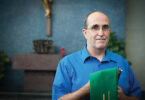
Leon Suprenant is the pastoral associate for administration in the office of the permanent diaconate. He also blogs at: www.archkck.org/blog.
by Leon Suprenant
My family bought a new home a few months ago and to consummate the deal we had to attend the closing.
It’s amazing how many different documents we had to sign to “seal the deal.” After a while, I was tempted to just keep signing and stop looking at what I was signing. However, I realized that I needed to understand what I was doing and not gloss over the necessary details.
The ordination of our next cohort of permanent deacons is rapidly approaching. The 17 deacon candidates are experiencing a “closing” themselves, as there are some very important documents they need to sign before they may be ordained.
In fact, an ordination is even more important — and more permanent — than a real estate transaction. Therefore, I thought I would describe a few of the required documents, as they all teach us something about becoming a deacon.
Petition for Holy Orders
In the weeks leading up to ordination, the candidates petition the archbishop, requesting the reception of holy orders. They complete this petition in their own handwriting and then wait for the archbishop’s response. Nobody has the “right” to ordination. Rather, each man humbly seeks the affirmation of his call from the church, represented by the archbishop.
In the petition, the candidates — all of whom are married — also state that they understand and accept the fact that they will remain celibate if their wife predeceases them.
Wife’s consent
Even though it’s the husband who is being ordained, the church requires the wife of a married deacon candidate to give her consent to the ordination in writing. At minimum, the church wants to ensure that the husband’s prior vocation to marriage is not harmed by this new commitment. That said, in most cases diaconal formation and ordination tends to strengthen marriage.
Oath of Freedom
All candidates for ordination should be free to say “yes,” and not be motivated by any sort of fear or coercion.
Profession of faith
The deacon candidate affirms his acceptance in faith of all that the church proposes for belief. After all, the deacon is called to be a representative of the church, and not merely a representative of his own opinions.
Oath of Fidelity
With this oath, the deacon candidate builds on the “oath of freedom” and pledges his fidelity and obedience to the church. If the bishop is the shepherd, the deacon is certainly his sheepdog, loyally assisting the bishop in his pastoral duties.
These documents show the candidates’ acceptance of the call to generously, joyfully and faithfully hand on what they have received. As the deacon candidates prepare to minister to a culture that needs to be evangelized, please pray that they will be ready to “close.”

